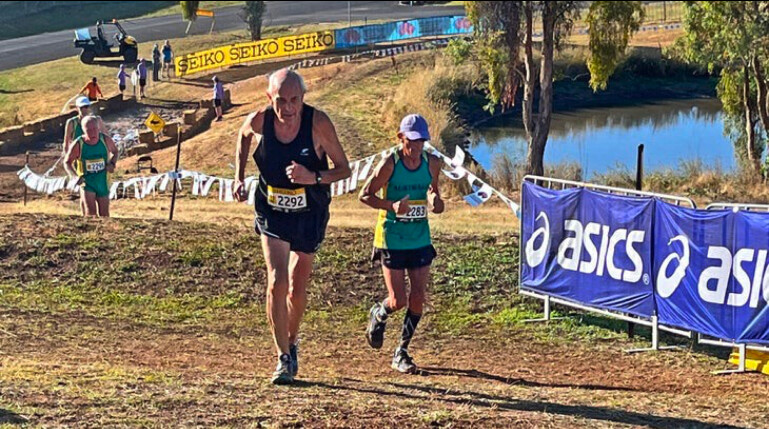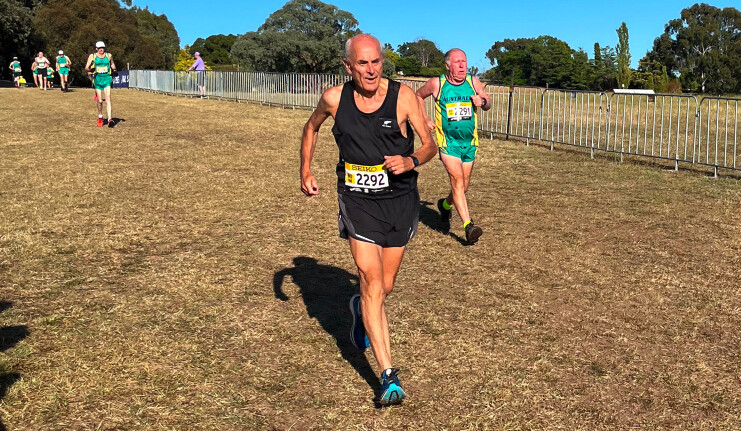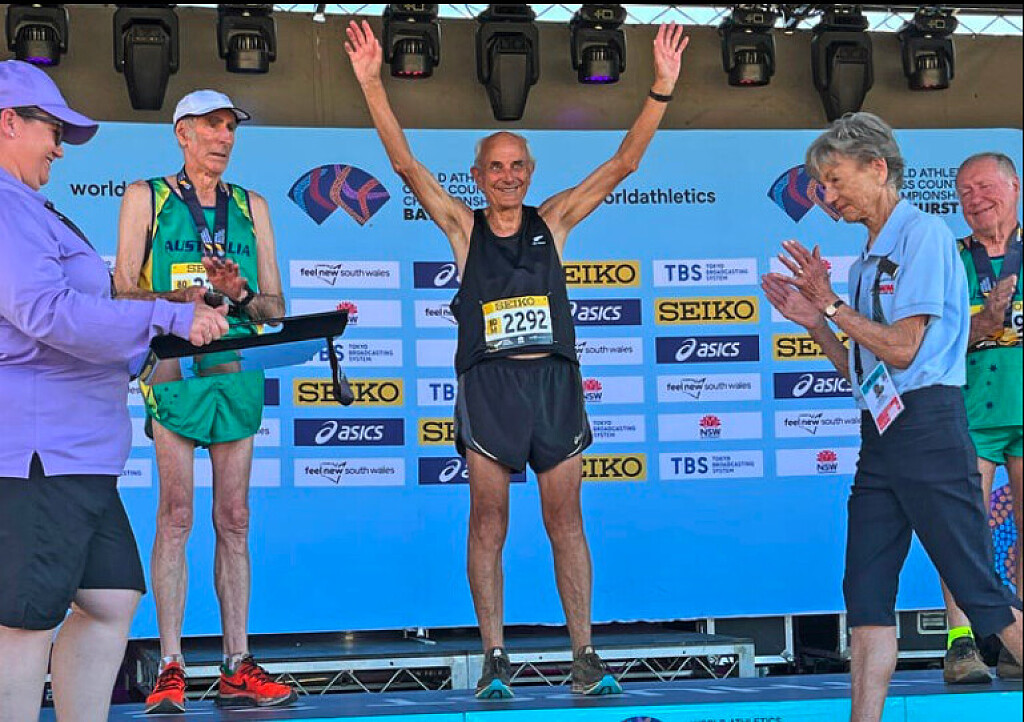Running News Daily
Running News Daily is edited by Bob Anderson. Send your news items to bob@mybestruns.com Advertising opportunities available. Train the Kenyan Way at KATA Kenya and Portugal owned and operated by Bob Anderson. Be sure to catch our movie A Long Run the movie KATA Running Camps and KATA Potato Farms - 31 now open in Kenya! https://kata.ke/
Index to Daily Posts · Sign Up For Updates · Run The World Feed
How I Won the World Cross-Country Championship at Age 83
Seventy years after his first cross-country race and 46 years after competing as an elite runner, the author competes—and triumphs—on a tough Australian course
Last weekend, in Bathurst, Australia, I did something I thought I would never do again: I ran once more in the World Cross-Country Championship. Not the main men’s open race, in which I competed for England in 1966 and New Zealand in 1977. Not at age 83. But for the first time, the World Athletics federation added Masters championships, and—almost like a dream—I not only participated again, but raced at the front of the M80 field and managed to outlast a stubborn Australian for the win.


If you believe that running after eighty is about leisurely slow toddling, wait till you’re up there, racing to your limit, and you make the sharp u-turn at halfway and see that you are being closely stalked by a lean lanky Aussie with M80 on his bib and a threatening scowl like Mel Gibson in Lethal Weapon.
He is called James Harrison, and he made me work for it. I have won and lost many hard races over the years, and this was one of the hardest. The only possible tactic was unrelieved pressure. I finally broke him three-quarters through the four-kilometer distance, on the second two-kilometer lap, as we gasped up a big steep rough-surfaced hill that broke many hearts that weekend. At last, I sensed him drop. It took tenacity, months of focused training (including hill repeats), and years of learning the wiles that true cross-country demands.
This was a course where every decision counted about where you placed your next stride. Every sharp oxygen-draining uphill demanded that you keep momentum over the crest, every downhill was there for attack, not recovery, every tight turn required poise and pace. Those things don’t come easily after age eighty (and on two replaced knees in my case), but it was a World Championship of cross-country running, and we were there to take those tests.
I won’t claim the sheer thrill of winning the race was the same as ever. But it was real, and it had a private significance. I ran below my best in the senior world championship in the past. Nothing can change those results, but it felt good this time to get it right. And the sense of achievement is something that few things in the last years of life are ever likely to equal.
World Athletics, under President Seb Coe (who learned cross-country in England in his early teens), has grown tired of holding its cross-country championships on boring flat safe horse-race circuits, like those I encountered in my days in the main race. They decided to take some security risks to revitalize the sport. American senior administrator David Katz now acts as course consultant for each World Cross-Country, and insists on the real thing.
“Cross-country has one distinctive thing, the course. That has to be the talking point, and each one must be unique as the race moves around the world. The media and the public need to understand that cross-country is special in its challenges, not just another long race,” Katz said in Bathurst.
The previous championships in 2019 in Aarhus, Denmark, set the world chattering about a course that included loops over the steeply-sloping grassed roof of the Moesgaard Museum. This time (after several Covid-related postponements) the Aussies gave us a course that was a raw slice of the Australian outback. On the side of Mount Panorama, it was broken and unpredictable, rusty dirt, grey raggedy scrub grass, and diabolical hills. Scattered blue gum trees provided the only shade. Each morning, you could find fresh kangaroo poop.
They added some challenges to make it even more uniquely Australian. There was a “billabong,” of treacherous ankle-deep wet mud that caused many runners to skid and flop to a slimy downfall. (Some of the slower kids in the scholastic races lay down and daubed themselves heroically.) There was a dash through the straight vines of a winery, followed by tight turns, and, in honor of Bathurst’s motor-race circuit, a “chicane” where you had to steer through a forest of car tires.
High on a dry hillside there was a stretch named “Bondi Beach,” deep shifting sand decorated with lifeguard flags and “Beware of Sharks” signs. An Aussie joke, yet for the runners, another testing change of racing rhythm, another response to the challenge of contours and terrain. No other kind of running does that. Cross-country is the closest our sport gets to true interaction with the earth.
Added to all that was the Outback summer heat, 95 degrees for the main races on the Saturday late afternoon. In the different races, several runners were taken to hospital, and at least four passed out during the race, including, it seemed, the women’s favorite and race leader, Letesenbet Gidey (Ethiopia), who collapsed dramatically and glazy-eyed as she was passed by Beatrice Chebet (Kenya) within strides of the finish.
As a serious evening storm approached, its clouds like dark riders, the men’s race was hastily moved forward, and 22-year-old Ugandan Jacob Kiplimo had to win his first major title while lightning flashed behind the mountain and brutal wind gusts sent runners staggering. Slower runners were caught in torrential rain. Australia does nothing by half measures.
For me and many others, Australia was an unexpected opportunity. Three months before the race, World Athletics and World Masters Athletics announced that they were combining to add masters championships, part of a new and excellent policy to make the event a full cross-country festival, as well as the world’s elite team and individual championships. Hundreds of spectators doubled as competitors. I met so many old friends out there, it was like a global runners’ reunion.
In addition to the usual competitors from Europe, North America and Africa, there were teams from Fiji, Papua New Guinea, Tonga, and other Pacific nations, none of them obvious participants in a sport that is essentially one of cold winter.
I guess an 83-year-old who last ran the World Cross-Country in 1977 was another less-than-obvious participant. I never imagined it. I gave up cross-country for good, I believed, when my orthopedic surgeon confessed, after he watched me and the knee he had implanted struggle over a muddy course, that it gave him nightmares for weeks.
But a lifetime of racing has taught me that you have to seize the moment. Before committing, I watched videos of the course, which like a good actor came across looking much more attractive than it was. When I actually saw the steep downhills, I thought I was out of my mind. But another thing I have learned is that in running, only one thing is absolutely certain—you won’t run well if you’re not in the race.
I registered. I did the work. I seized my moment. I got the sheer thrill of winning a race. I was lucky in that the course’s surface proved (mostly) not too lumpy or too soft, and I was lucky in some top Europeans and South Americans not making the journey. In every race, you can only compete against those who show up.
Young readers, please note. In January 1953, aged 13, I ran my first cross-country race, in my high school’s inter-house league, well back in the field. Seventy years a runner. You never know what a high school race might lead to.
Being called world champion at 83 is a nice way to celebrate that small private anniversary—and at this age, I can surely be forgiven a memory lapse, if sometimes I forget to add “over-80.” It could also be a nice way to round off seventy years of running. Round off, except for the next race, that is.
(Roger Robinson ran the world cross-country championship for England and later New Zealand, and set a Masters record of 2:20:15 at the Boston Marathon. He is regarded as the outstanding historical writer on running. He recaptures history from personal observation in When Running Made History (Syracuse University Press) and he researches vivid and accurate accounts of the sport’s best stories in his new book, Running Throughout Time: the Greatest Running Stories Ever Told (Meyer & Meyer). Available through Amazon and all online outlets and bookstores.)
by Outside (Roger Robinson)
Login to leave a comment




